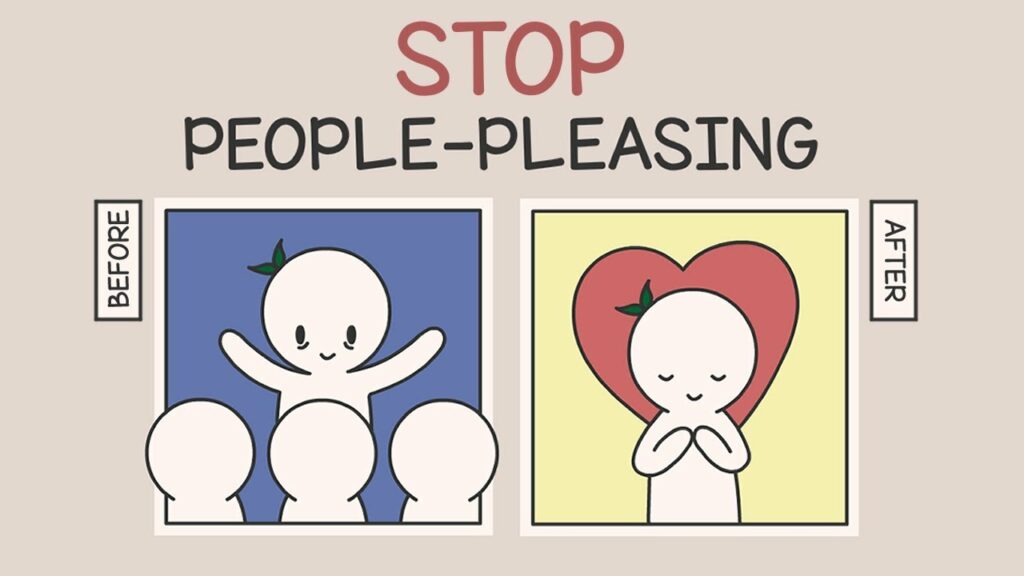Do you always feel like you need to please others? Do you feel like you can never say no? If so, then you may be struggling with being a people pleaser. This is a common issue, but it can be very damaging to your mental health and your relationships. In this blog post, we will discuss some tips and tricks that can help you stop being a people pleaser.
Contents
- 1 How To Know You Are A People Pleaser?
- 2 Therapy For Managing People Pleasing Behavior
- 3 Self Help Tips To Stop Being A People Pleaser
- 3.1 Have Boundaries
- 3.2 Learn To Say No
- 3.3 Prioritize Self-Care
- 3.4 Start Slow
- 3.5 Focus On Rewording Your Feelings
- 3.6 Be Mindful
- 3.7 Create A Mantra
- 3.8 Know When You’re Being Manipulated
- 3.9 Remind Yourself You Can’t Do Everything For Everyone
- 3.10 Ask For Space/Time
- 3.11 Acknowledge Uncomfortable Feelings
- 3.12 Celebrate Your Progress
- 4 Benefits Of Not Being A People Pleaser
- 5 Conclusion
- 6 A Word From Therapy Mantra
How To Know You Are A People Pleaser?

There are some common signs that you may be a people pleaser. Do any of the following sound familiar to you?
- Always putting others before yourself, even if it means sacrificing your own needs
- Saying yes to things that you don’t want to do, just because you don’t want to disappoint others
- Avoid conflict at all costs and will go out of your way to keep the peace
- Having a hard time saying no, even when you need to
- Feeling like you can never do enough for others and are always trying to please them
- Being aversive to conflict
- Facing difficulty saying no and being assertive
- Having trouble making people believe in them
- Tendency to be passive-aggressive
If any of these behaviors resonate with you, you might be a people pleaser.
Therapy For Managing People Pleasing Behavior
Seeking help from a mental health professional can help you figure yourself out. A therapist can help by analyzing factors such as your past, the quality of your personal/social relationships, your expectations, attachment styles, and other relevant factors to understand the cause of these behaviors. Moreover, they work with you to come up with coping strategies to be more assertive, and self-reliant and avoid feeling mentally/emotionally exhausted.
Self Help Tips To Stop Being A People Pleaser
While people-pleasing tendencies can not be completely fixed or cured, there are various tips and techniques one can use to control those behaviors. Some of them include:
Have Boundaries
It becomes very important to define your limits and capacities when dealing with people. Know your potential, and be firm about letting others utilize it.
Learn To Say No
Be assertive and strong when saying ‘no’. Some other ways you can practice saying no is:
- I won’t be able to make it
- I don’t have the space for this
- Unfortunately, I’ll have to pass on this time
- This does not suit my capacities right now
Prioritize Self-Care
Take care of your mental, physical, emotional, and spiritual well-being by indulging in self-care activities that you enjoy. Remember, you should be your priority.
Start Slow
Don’t pressure yourself into achieving everything in one go. Be steady and realistic with your pace of handling things.
Focus On Rewording Your Feelings
The way you express yourself with words is important to portray your self-confidence. For example:
- Instead of saying ‘I am okay with whatever you want, try saying ‘I want ___, but we can mutually adjust’
- Creating emphasis on a “no” by saying ‘I’d rather not’ or ‘I just don’t feel like it’ without exaggerated excuses or reasons.
Be Mindful
Avoid taking responsibility for something that isn’t your fault. Being aware of your surroundings and actions, and not assuming everything to be your fault, is a key step to avoiding people-pleasing.
Create A Mantra
Having an empowering stance with yourself can make you feel positive and provide a boost of self-confidence. Some statements you can use are:
- I am not the opinion of those who don’t know me.
- ”No” is a full sentence.
- Not my circus, not my monkeys.
- A ‘no’ to them is a ‘yes’ to myself.
Know When You’re Being Manipulated
When you start standing up for yourself, people who are habitual of taking advantage of you may indulge in excessive flattery to make you side with them. Be mindful of these behaviors and avoid them.
Remind Yourself You Can’t Do Everything For Everyone
Not everyone can be satisfied all the time. Disapproval and rejection are common emotions. Instead of taking them personally, one should learn how to be cordial with them.
Ask For Space/Time
You don’t need to give immediate responses each time you are approached for help. Politely let the person know you need some time to think through things before giving an immediate ‘yes’ for an answer. This can effectively reduce people-pleasing tendencies and make space for self-reflection.
Acknowledge Uncomfortable Feelings
You may feel awkward, odd, rejected, helpless, or any emotions in that range when you start enforcing boundaries. Take time to process and acknowledge these feelings and make peace with them.
Celebrate Your Progress
Make room for celebrating your success. Progress can be slow, yet your commitment, consistency, and intent are what deserve acknowledgment and generosity.
Benefits Of Not Being A People Pleaser
Now that we have analyzed some tips to stop being a people pleaser, we will now understand how the application of these will benefit you.
- Improves self-confidence
- Establishes healthy boundaries
- Makes a person more expressive of their emotions
- Reduces the feeling of emotional fatigue
- Improves the quality of personal and social relationships
- Enhances performance in the workplace
Conclusion
People pleasers tend to put others’ needs above their own, and they often do not know how to set boundaries. This can lead to feelings of resentment. If you are a people pleaser, it is important to learn how to set boundaries. You deserve to have your needs met too!
A Word From Therapy Mantra
Your mental health — Your psychological, emotional, and social well-being — has an impact on every aspect of your life. Positive mental health essentially allows you to effectively deal with life’s everyday challenges.
At TherapyMantra, we have a team of therapists who provide affordable online therapy to assist you with issues such as depression, anxiety, stress, workplace Issues, addiction, relationship, OCD, LGBTQ, and PTSD. You can book a free therapy or download our free Android or iOS app.


